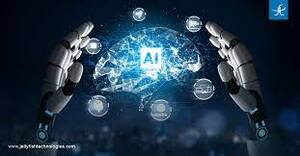Empowering Business Growth: How AI App Development Boosts Software Product Development
Body
Artificial Intelligence (AI) is transforming industries and revolutionizing the way businesses operate. In the realm of software product development, AI app development is emerging as a game-changer, offering immense potential for empowering business growth. As businesses strive to stay competitive and meet evolving customer demands, integrating AI into software product development has become crucial. In this blog, we will explore how an Artificial Intelligence app development company can boost software product development and drive business growth, with a focus on the benefits, innovative approaches, and real-world applications of AI-powered software products.
1. The Power of AI in Software Product Development
- Improving Efficiency: AI-driven applications automate repetitive tasks, streamline processes, and optimize resource utilization, leading to increased efficiency and reduced operational costs.
- Enhancing User Experience: AI-powered applications can analyze user behavior and preferences, providing personalized experiences and improving user engagement.
- Data-Driven Decision Making: AI algorithms process vast amounts of data quickly, enabling businesses to make informed decisions based on actionable insights.
2. Leveraging AI for Innovative Software Product Development
Natural Language Processing (NLP)
Advanced Chatbots: AI-powered chatbots equipped with NLP capabilities can understand and respond to natural language, enhancing customer support and interactions.
Voice Assistants: Voice recognition powered by NLP enables voice-controlled software products, improving accessibility and user convenience.
Machine Learning (ML)Predictive Analytics: ML algorithms analyze historical data to predict trends, forecast demands, and identify potential issues, enabling data-driven decision-making.
Personalization: ML-driven applications analyze user behavior to offer personalized content, product recommendations, and services, enhancing customer satisfaction.
Computer VisionImage and Video Analysis: AI-powered computer vision enables software products to analyze images and videos, supporting tasks such as facial recognition and object detection.
Visual Search: Computer vision technology allows users to perform visual searches, enhancing e-commerce experiences and enabling accurate image-based searches.
3. Accelerating Development Processes with AI
Agile Development MethodologyIterative Development: Agile practices enable iterative development and quick prototyping, allowing for frequent feedback and refinement.
Continuous Integration: Agile promotes continuous integration and testing, ensuring a steady flow of functional and reliable features.
Automated TestingTest Automation: AI-driven testing tools perform automated testing, reducing the time and effort required for comprehensive testing.
Regression Testing: AI-powered testing solutions facilitate efficient regression testing, ensuring software product development stability throughout updates and changes.
4. Improving Software Product Quality with AI
Bug Detection and Prediction
AI-Driven Bug Detection: AI-powered tools detect and report bugs in software products, leading to quicker issue resolution and improved product quality.
Predictive Quality Assurance: AI algorithms analyze historical data to predict potential quality issues, enabling proactive measures to ensure high-quality software.
Automated Code GenerationAI-Driven Code Generation: AI-based tools assist developers in generating code snippets, speeding up development processes and reducing manual coding errors.
Smart Code Refactoring: AI-powered refactoring tools identify areas for code optimization and suggest improvements, enhancing software performance and maintainability.
5. Enhancing Customer Support and Engagement with AI
AI-Powered Customer Support
Virtual Assistants: AI-driven virtual assistants provide round-the-clock customer support, answering queries and resolving issues instantly.
Sentiment Analysis: AI algorithms analyze customer feedback and sentiment to gauge satisfaction levels and improve service quality.
Chatbot IntegrationLive Chat Support: AI-powered chatbots offer real-time assistance to website visitors, improving customer engagement and reducing response time.
Order Tracking: Chatbots with AI capabilities can provide order status updates, shipment details, and delivery notifications, enhancing the post-purchase experience.
6. Leveraging AI for Business Intelligence and Insights
Data Analytics and Insights
Real-time Data Processing: AI-powered data analytics process vast volumes of real-time data, providing actionable insights for informed decision-making.
Predictive Analytics: AI algorithms analyze historical data to predict market trends, customer preferences, and business opportunities.
Competitive AnalysisAI in Market Research: AI-powered tools can analyze competitor data, market trends, and industry benchmarks to inform business strategies.
Price Optimization: AI algorithms analyze pricing data to optimize product pricing strategies, ensuring competitiveness and maximizing revenue.
7. Streamlining Business Operations with AI
Supply Chain OptimizationAI in Inventory Management: AI-powered algorithms optimize inventory levels, reducing carrying costs and minimizing stockouts.
Demand Forecasting: AI-driven demand forecasting enhances supply chain planning and resource allocation.
AI-Driven Sales and MarketingSales Forecasting: AI algorithms forecast sales trends, helping businesses make informed decisions about sales strategies and target setting.
Personalized Marketing Campaigns: AI-powered marketing platforms analyze customer data to deliver personalized marketing messages, increasing customer engagement.
8. The Future of AI App Development and Software Product Development
- AI-Driven Automation: AI will continue to automate various aspects of software product development, accelerating processes and reducing manual efforts.
- AI and IoT Integration: The convergence of AI and the Internet of Things (IoT) will create intelligent and interconnected software products, facilitating data-driven automation.
- Enhanced Natural Language Processing: NLP advancements will lead to more sophisticated and context-aware language processing, enabling more human-like interactions.
Conclusion:
AI app development is a driving force behind innovative software product development, revolutionizing the way businesses operate and grow. By leveraging AI capabilities such as NLP, ML, and computer vision, software products can provide personalized user experiences, data-driven decision-making, and efficient automation. Accelerated development processes and improved software product quality result from the integration of AI, enhancing customer support, engagement, and insights for business intelligence. As AI continues to advance, the future holds even greater possibilities for empowering business growth through AI-powered software product development. Businesses that embrace AI app development will gain a competitive edge, meet customer expectations, and stay at the forefront of technological innovation in the digital era.













Comments